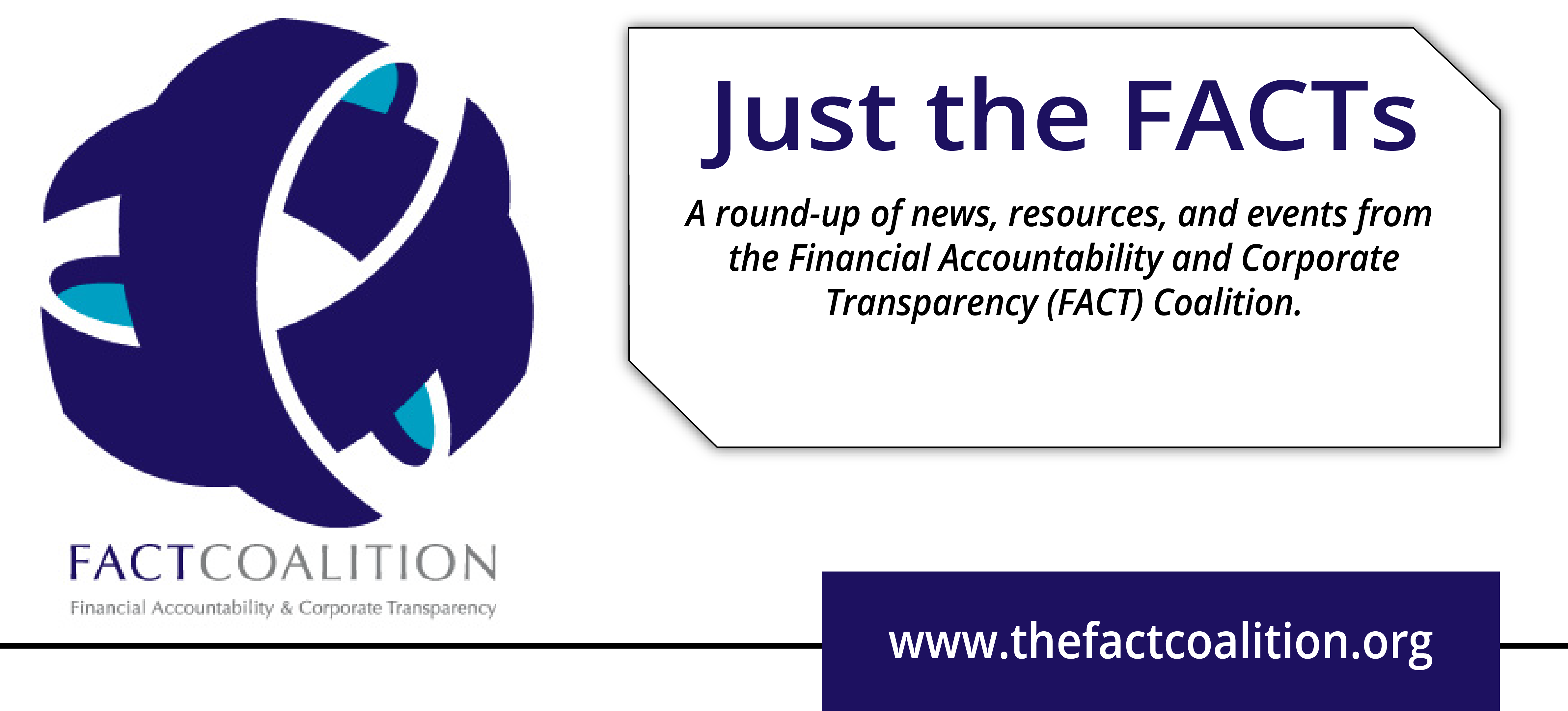“Just the FACTs” is a round-up of news stories and information regarding efforts to combat corrupt financial practices, including offshore tax haven abuses, corporate secrecy, and money laundering through the financial system.
Send feedback or items for future newsletters to Thomas Georges at tgeorges@thefactcoalition.org
State of Play
Congress Passes Massive Tax Cuts for Corporations, Cuts to Vital Services for Ordinary Americans
On July 3, Congress passed a budget reconciliation bill containing trillions of dollars of highly regressive tax cuts for wealthy individuals and corporations at the cost of steep cuts to healthcare, food assistance, and climate programs. In addition to domestic corporate tax breaks – which are estimated to cost more than $750 billion over the coming decade – the bill also includes nearly $170 billion in international tax breaks benefitting large multinational companies. The bill was signed into law by President Trump on July 4.
In a statement, Zorka Milin, policy director of the FACT Coalition, characterized the bill as both fundamentally harmful and a missed opportunity. “Taken altogether, this bill moves nearly every aspect of the tax code in the wrong direction,” said Milin. “Instead of discouraging the offshoring of jobs, Congress gave the worst-offending corporations a tax cut. Instead of investing in America’s clean-energy future, it offers billions in new handouts to oil and gas. And instead of making the tax code fairer for working families and small businesses, it cuts vital assistance programs that communities rely on. This year, Congress had a major opportunity to implement real, commonsense tax reform. Instead, they chose to do the opposite.”
Tax and Spending Cuts, In All the Wrong Places
The bill’s international provisions include a cut in the tax rates on corporations’ foreign profits and export income. While these rates will be slightly higher in 2026 than the currently applicable rates, Congress did not allow the full increase that was scheduled to occur. As a result, corporations will receive a tax cut of nearly $87 billion relative to current law. Other changes to how multinational corporations are taxed are estimated to cost tens of billions more over the coming decade.
One provision that was notably absent from the final bill was a particularly egregious exemption for certain income booked in the U.S. Virgin Islands that would have cost nearly $1 billion in lost tax revenue. Per recent reporting in the Washington Post, this exemption seems to have been designed to largely benefit only a single firm already operating in the Virgin Islands, while doing nothing to stimulate future investment in the territory.
SCOOP: The House tax bill includes a carve out sought behind the scenes by a $75 billion private credit giant
— Jeff Stein (@JStein_WaPo) June 14, 2025
The firm is owned by billionaire brothers Lawrence & David Golub, who have given $2 million in campaign contributions since 2020
The provision, an exemption to a global…
Other international tax changes included in the final budget bill include a deeply regressive tax on the money that immigrants and others send abroad – called remittances.
The bill also includes a $1 billion handout providing favorable treatment to major oil and gas companies under the Corporate Alternative Minimum Tax (CAMT), which levies a 15 percent tax on the profits of the largest U.S. corporations. In June, Senator Elizabeth Warren of Massachusetts led a letter to major oil companies requesting additional information on their lobbying activities toward securing this new tax carveout.
The CAMT carveout was only one piece of the more than $18 billion in new and expanded tax handouts for oil and gas companies in the final bill. Tax incentives for clean energy production and electric vehicles, meanwhile, were slashed by nearly half a trillion dollars. Health programs were also the subject of deep cuts, projected to take away health insurance from 17 million individuals.
Administration Strikes a False Blow for “U.S. Tax Sovereignty”
On June 26, just days before the passage of the reconciliation bill, Treasury Secretary Scott Bessent announced a preliminary understanding between the U.S. and other G7 countries that exempts U.S. multinational corporations from certain taxes under the globally agreed minimum tax regime, also known as “Pillar Two”. The Secretary’s announcement was followed by an official G7 statement expanding on the principles of the understanding.
The announcement only represents a non-binding understanding between a small subset of Pillar Two-implementing countries and the U.S. In a statement following the announcement, FACT’s Zorka Milin noted that “…this non-binding compromise is not the end of the road for Pillar Two, but actually reaffirms a commitment to multilateral cooperation against corporate tax avoidance.”
“Any changes to national laws to accommodate the U.S. position must still be adopted by the legislatures of the nearly 150 countries that have committed to ending the global race to the bottom on corporate taxes,” said Milin.
The G7 announcement was immediately followed by the removal of a controversial international retaliation tax provision – the proposed Section 899, commonly called the “revenge tax” – from Congress’ tax reform bill.
Good riddance to the terrible "revenge tax" that would have harmed America more than any other country.
— Zorka Milin (@ZorkaMilin) June 26, 2025
But before celebrating and claiming a win for US tax sovereignty, let's do a better job of taxing our corporations, and stop letting them use tax havens to dodge taxes. https://t.co/b1of1uxih7
Though Section 899 had primarily been intended to punish nations that implemented elements of Pillar Two, it also allowed for retaliatory taxes to be levied against foreign countries with digital services taxes targeted at major tech companies. Such taxes remain on the books in dozens of jurisdictions, reinforcing the need to reach a multilateral consensus on taxation of the global digital economy through Pillar One, another OECD-negotiated tax regime agreed to by more than 140 countries.
Latest from FACT

FACT Submits Comments on Reporting Form for Landmark Real Estate Anti-Money Laundering Regulations
Read FACT’s comments to Treasury on the final reporting form that will be used by covered entities and individuals under groundbreaking new anti-money laundering regulations for all-cash real estate purchases.
Absent full, faithful implementation of Treasury’s new regulations, the residential real estate sector remains particularly vulnerable to money laundering. FACT welcomes the release of the final reporting form to implement these rules, and calls for certain changes to minimize compliance costs and ensure the accuracy of filings.
FACT in the News

The Washington Post: $75 billion firm wins carve-out in tax bill after lobbying push
FACT policy director Zorka Milin was quoted by The Washington Post in their coverage of a galling exemption for U.S. Virgin Islands income from a law meant to crack down on the use of tax havens. Following the Washington Post’s reporting, the provision was ultimately removed from the final reconciliation package.
“The purpose of the 2017 tax law, this specific provision, was to deter the use of these kinds of tax havens…this would undermine that very purpose,” said Milin.

TaxNotes: Senate Offers Up ‘Defanged’ Remittance Tax, but Critics Remain
TaxNotes cited FACT’s blog on the reconciliation bill’s regressive remittance tax, and quoted Zorka Milin in their coverage of the provision, as passed.
“These changes do nothing to mitigate the illicit finance risks associated with driving remittances back underground and ultimately make the provision even more targeted at the most vulnerable U.S. residents,” said Milin.
From Our Members and Allies

Global Financial Integrity: Beneficial Ownership Registries in Latin America and the Caribbean – Current Status, Challenges and Perspectives
A new report from Global Financial Integrity analyzes the current state of beneficial ownership registries in Latin America and the Caribbean, identifies key implementation gaps, and offers recommendations to increase transparency and accountability in the region.
The report includes case studies on Belize and Colombia, two countries where Global Financial Integrity provides direct technical assistance to support the development and implementation of beneficial ownership registries.

Public Citizen: Trump Bullies Canada On Behalf of Big Tech, Workers Continue to Lose Out
Read Public Citizen’s statement in response to Canada’s announcement that it would drop its digital services tax on major tech companies like Apple, Amazon, and Google.
From the statement: “The Trump administration is carrying water for Big Tech companies by weaponizing tariff negotiations to ensure that countries are unable to regulate and tax American technology companies. Using sweeping trade threats to target Canada’s digital services taxes is just the latest example of the Trump administration forcing global deregulation to further enrich the world’s biggest tech corporations.”

Tax Justice Network and CICTAR: Bad Medicine: A Clear Prescription = Tax Transparency
A new blog from Tax Justice Network, in collaboration with the Centre for International Corporate Tax Accountability and Research, covers a recent shareholder resolution at pharmaceutical giant Merck calling for more transparent tax planning practices.
From the blog: “Despite reporting more than half of its revenue in the U.S., [Merck] reported a loss of almost $2 billion in the U.S. while making $22 billion abroad in 2024. Without public country by country reporting, it is difficult to know where Merck does business and pays tax (or not) outside of the U.S.”
Recent and Upcoming Events

UN 4th International Conference on Financing for Development
FACT Coalition Executive Director Ian Gary participated in the UN’s 4th International Conference on Financing for Development in Seville, Spain, from June 30 to July 3. The conference was attended by around 10,000 government officials, civil society organizations, and private sector representatives. The final outcome document, agreed by 192 countries (but not the U.S.), contains important new commitments to: expand transparency efforts to reveal the true owners of companies and exchange information across borders; “effectively regulate professional service providers” who help move illicit funds; and to increase tax transparency of multinational corporations.
Along with Transparency International, the UNCAC Coalition, Open Contracting Partnership, and other groups, FACT co-sponsored an official side event on steps that need to be taken to address corruption and illicit finance to support the achievement of the UN’s sustainable development finance goals.
About the FACT Coalition

